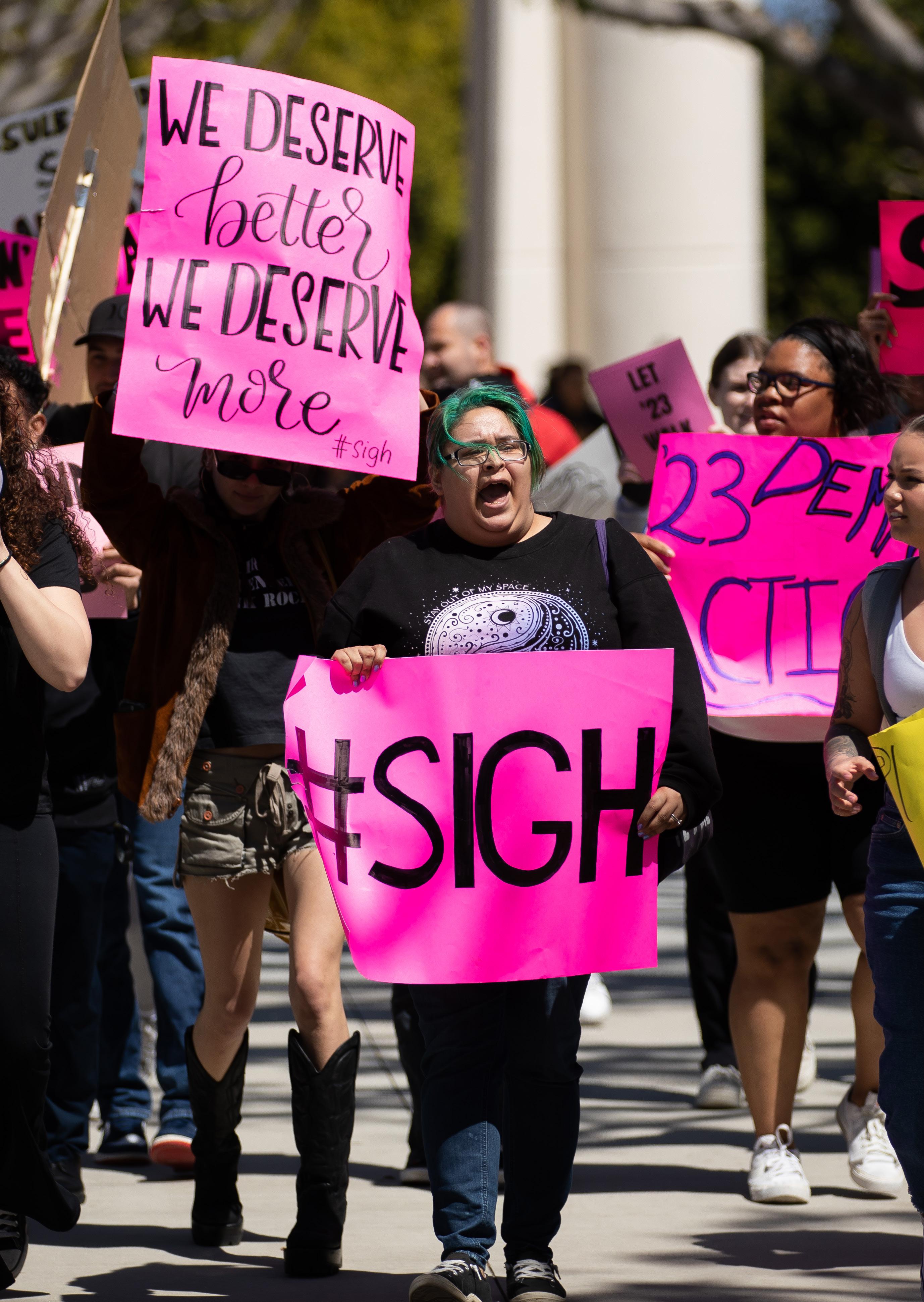




































CSULB students march through the middle of campus wielding signs and chants in protest of the school’s decision to not allow the graduating class of 2023 walk across the main stage.






































CSULB students march through the middle of campus wielding signs and chants in protest of the school’s decision to not allow the graduating class of 2023 walk across the main stage.
1250 Bellflower Blvd., LA4-203 Long Beach, CA, 90804
Editorial Office Phone (562) 985-8000 Business Office Phone (562) 985-1740
Christal Gaines-Emory Editor in Chief
eic@daily49er.com
Kristina Agresta Business Manager business@gobeach.media
Leila Nunez Multimedia Managing Editor multimedia@daily49er.com
Kristina Agresta Managing Editor
managing@daily49er.com
Editors
Hannah Shields News Editor news@daily49er.com
Kadie Gurley Arts & Life Editor arts@daily49er.com
Georgie Smith Opinions Editor opinions@daily49er.com
Matthew Gomez Sports Editor sports@daily49er.com
Gisele Robinett Creative Director design@daily49er.com
Chief Copy Editor
Rosaura Montes
Sam Farfan Special Projects Editor
Photo Editor
Social Media Editor
Sonny Tapia
Maureen Linzaga
Luke Wines Video Editor
Podcast Editor
Public Relations Editor
Community Engagement Editor
Isabel Silagy
Kaitlyn Rowell
Richie Rodriguez
AssistAnts
News Assistants
Jaylen Minnich
RENZO POCASANGRE / Daily Forty-Niner
The Daily Forty-Niner class of ‘23 had hopes of walking, and instead were met with yet another ceremony that robs a prestigious moment for CSULB graduates. From left to right, Sonny Tapia, Richie Rodriguez, Hannah Shields, Kadie Gurley, Isabel Silagy and Kaitlyn Rowell are pictured.

This year, for the third year in a row, California State University, Long Beach will be hosting its commencement ceremony at Angel Stadium and will once again not be announcing graduate’s names.
This decision by the school’s administration has outraged not only the student body but also parents, faculty and friends, prompting the movement “Let ‘23 Walk.”
In this edition of the Daily Forty-Niner, our stories will highlight the student’s perspective on the decision. This issue aims to answer the public’s questions of why can’t CSULB graduates walk and hopefully show the administration that taking this monumental experience away from its seniors is the wrong move.
A lot of our senior staff members have been in college for a long time, some of whom have taken a gap year and made the decision to come back to school, this school. Our class had to go through college during a global pandemic and some students didn’t even get a proper high school graduation.
Graduation is something we have worked so hard to get to and we all just want to have the same experi-
ence as the students before us.
Hearing my name and watching me walk across that stage has been something my mother and I have discussed since we moved to the United States in 2008. My mom has sacrificed so much in her life to get me to where I am and this victory is just as much hers as it is mine. She deserves this moment.
Administration has stated that they want commencement to be a nice and memorable experience for graduates, but we can firmly say that what they are offering will not be a great experience for anyone. It is an experience that is convenient and it is a blatant slap in the face to students who have dedicated their time and money to this school.
Other schools and classes before ours get the honor and recognition of walking across a stage and hearing their names get called. We are not even opposed to Angel Stadium at this point, we just want the recognition we deserve.
Here at the 49er we acknowledge that the school we report on is located on the sacred site of Puvungna, “the gathering place”. We are on the land of the Tongva/Gabrieleño and the Acjachemen/Juaneño Nations who have lived and continue to live here.
We also acknowledge the Gabrieleño/Tongva (pronounced: GABRIEL-EN-YO/TONG – VAH) and Acjachamen/Juaneño (pronounced: AH-HACH-AH-MEN/JUAN-EN-YO) as the traditional custodians of the Los Angeles region along with the Chumash (pronounced: CHOO-MOSH) to the north and west, and the Tataviam (pronounced: TAH-TAH-VEE-YUM) and Cahuilla (pronounced: KAH-WEE-YAH) Nations to the east. We respect and value the many ways the Tongva/Acjachemen cultural heritage and beliefs continue to have significance to the living people and remind us about the sacred and spiritual relationship that has always existed here at what we now call California State University Long Beach.
Arts Assistants Stacey Chen
Andrea Lopez
Opinions Assistant El Nicklin
Nicholas Broadhead
Sports Assistants
Graphic Design Assistants
Copy Editor Assistants
Photo Assistants
Emmanuel Barrera
Naoki Gima
Jasmine Lee
Luis Castilla
Kimberly Estrada
Renzo Pocasangre
Armando Jacobo
Social Media Assistants Ani Gutierrez
Montse Palmerin
Video Assistants Tatiahna Bentley
Podcast Assistants
Ella McDonald
Lei Madrigal
Andy Nguyen
Aiden Swanepoel
BusinEss
Purva Rao Advertising Manager advertising@gobeach.media
Jasmine Lee Creative Director
creative@gobeach.media
Leila Nunez Web & Technology Manager
web@gobeach.media
Kaitlyn Rowell PR & Promotions Manager
Distribution Manager
PR@gobeach.media
Jesse Kalamian
Jazmin Gallardo distribution@gobeach.media
Jacob Mitchell Distribution Analyst distribution@gobeach.media
AdvisErs
Gary Metzker Design Adviser
Content Adviser
Barbara Kinglsey-Wilson
Jennifer Newton Advertising & Business Adviser
Letters Policy: All letters and emails must bear the phone number of the writer and must be no more than 300 words. The Daily Forty-Niner reserves the right to edit letters for publication in regard to space.
Editorials: All opinions expressed in the columns, letters and cartoons in the issue are those of the writers or artists. The opinons of the Daily Forty-Niner are expressed only in unsigned editorials and do not necessarily reflect the opinions of the journalism department or the views of all staff members. All such editorials are written by the editorial board of the Daily Forty-Niner.
Long Beach State students chanted and held signs outside Brotman Hall on Tuesday in protest of the spring commencement, after university officials declined to meet with them to discuss their graduation ceremony.
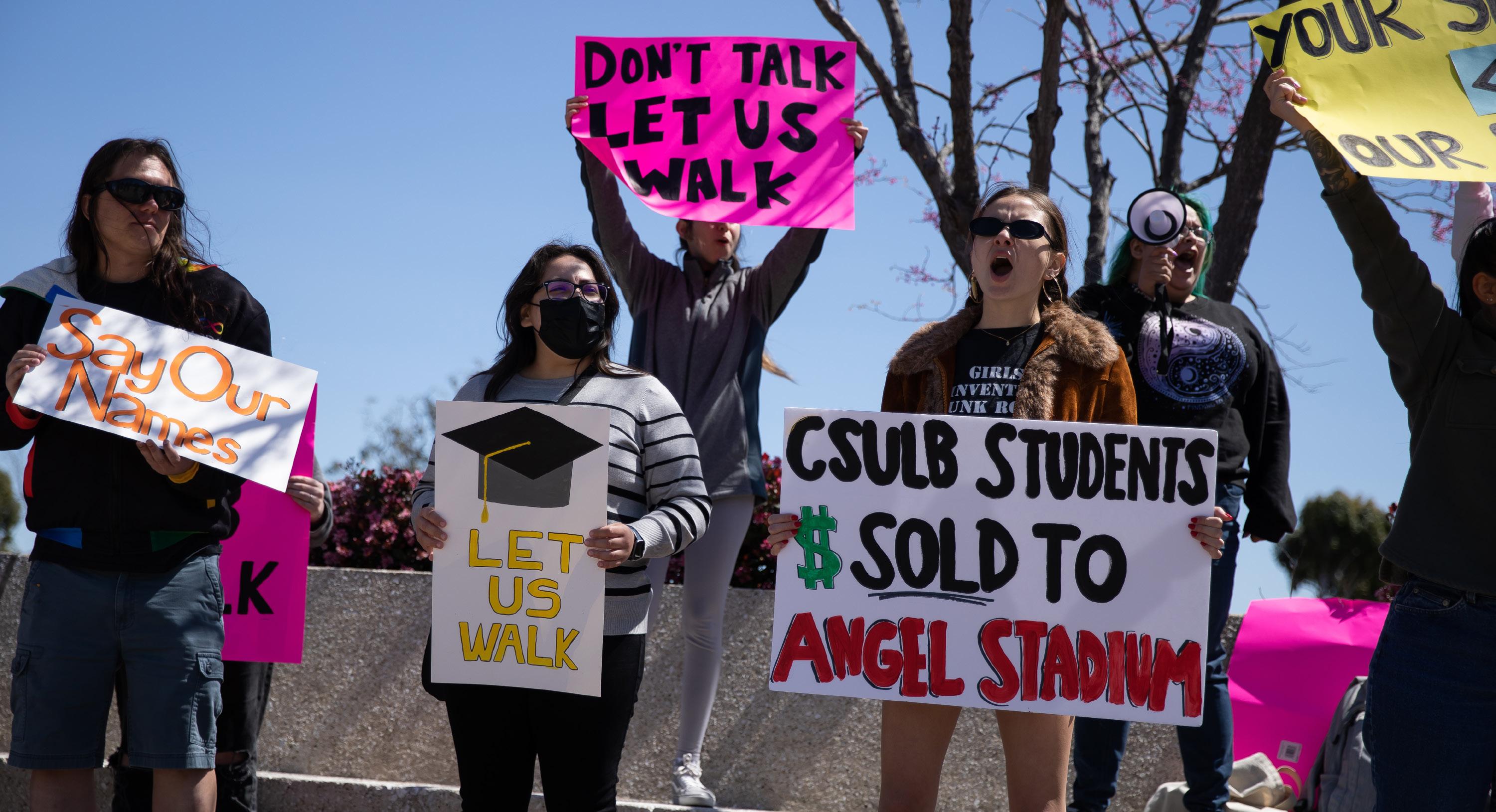
For the third year in a row, CSULB students were refused a traditional graduation ceremony, where graduates will not be permitted to walk across the stage or have their names called.
Zeina Elrachid, a fourth year molecular cell biology major and first generation student, lead the group of 35 demonstrators in a series of chants, such as “Don’t talk, let us walk,” “Stop playing games, call our names” and “We deserve appreciation, let us walk at graduation.”
Elrachid, along with Po Garcia and Mahek Patel, are the three CSULB student leaders of the organization, Let ‘23 Walk, with a Discord chat of over 800 participants that planned the demonstration.
“My parents crossed borders so I could cross the stage,” Elrachid said. “We are not going to go down without a fight, is that right?”
Among the flyers that were passed out during the demonstration was a copy of Elrachid’s email to CSULB President Jane Close Conoley on March 19, asking for a thirty minute meeting with the president.
The three organization leaders have
only managed to arrange a meeting with Jeff Klaus, vice president of student affairs, on March 13 over the issue, while the rest of the administration had been “silent,” according to the email.
Conoley’s response acknowledged the students’ concern, but did not offer an appointment to meet in person.
“You and other students are certainly heard,” Conoley said in her email. “I won’t repeat all the issues I’ve already shared.”
Sophia Moreno, a fourth year finance major, said it was important the administration hears the students’ concerns over the ceremony and take action, “rather than make up excuses every time.”
“I would’ve chosen to go to Cal State Fullerton or Cal State LA had I known Long Beach wouldn’t let us walk,” Moreno said.
Student demonstrators also handed out pink flyers with a QR code linked to a petition to let the 2023 class walk, which has currently over 18,000 signatures.
Among the gathered demonstrators was a parent who drove an hour from Redlands to support her daughter, Kristen Henry, who was graduating this spring with a major in child development and family studies.

“The walking and the reading of the name is the most important right of passage when you graduate college,” said Pamela Henry, the student’s mother.
Pamela Henry said Kristen Henry’s older sister graduated from UC Irvine in 2020 and the family had to miss the cer-
emony due to the pandemic, which “was very disappointing.”
“To have the same kind of carry over in a time where you can actually walk and read the names that’s not a covid issue seems unfair,” Henry said.
Many of the demonstrators were first generation students, such as Fady Mena,
a first generation Egyptian student with a major in electrical engineering. Mena said he had “lost respect” for the university.
“If we can’t change something, we’ll let them know they won’t get away with it,” Mena said. “Call it anything but graduation if they’re just going to make us sit there.”
For the third year in a row, CSULB is proceeding with a non-traditional graduation ceremony, despite protests from students, parents and faculty to change the upcoming graduation ceremony.
President Jane Close Conoley stated that the plans have not changed and students will not walk across the stage or have their names read aloud at commencement.
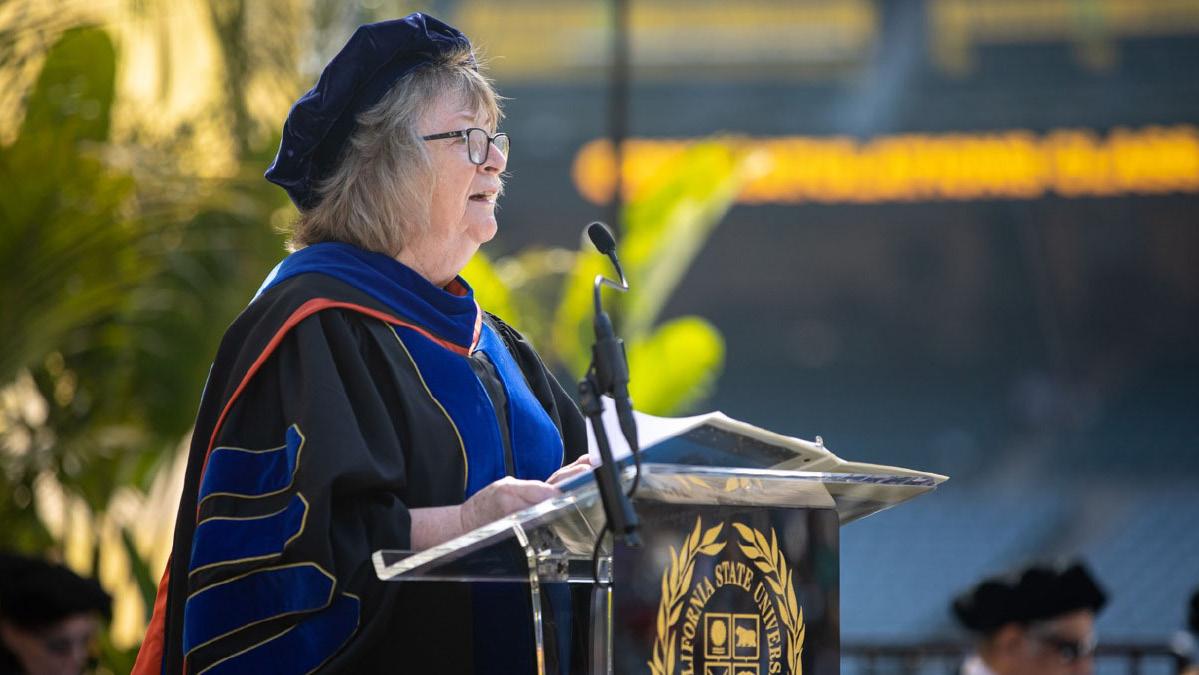
“We can’t make it work this year,” Conoley said. “I understand the students want to cross the stage, they want their names read. And we spent an enormous amount of time trying to figure out how to do that. We just couldn’t do it.”
Although the ceremony for spring is set, Conoley expressed hope for future ceremonies to include the more traditional elements after the 2023 commencement due to the feedback from frustrated students.
Administration has faced backlash as a result of this decision, there is currently a petition circulating that has reached more than 18,700 signatures as of April 7 and gained attention from reputable news outlets such as the Los Angeles Times, NBC Los Angeles and ABC7.
After a month without changes being made to the graduation plans, students chose to protest on April 4 in hopes of reaching university officials and urging them to reconsider the ceremony.
In an interview with Conoley, she stated that administration has done everything in its power to adjust the ceremony to best fit the needs of the students, faculty and guests.
Although she would like to return to a traditional ceremony, due to a variety of issues such as a lack of staffing, vendors and financial concerns, CSULB will not host a traditional ceremony for this year’s graduates.
“I know that there are many, many disappointed students, and I feel very distressed by that,” Conoley said. “But I can assure students
that we’ve gone back and forth about this over and over again, trying to find a solution.”
According to Conoley, university leaders begin plans for the spring ceremonies during the summer, so switching to a traditional commencement would not be attainable.
As a result of COVID-19, administration faced challenges arranging contracts with vendors for the past three years, leading them to settle on Angel Stadium as the graduation venue. A lack of staffing for commencement along with accessibility and parking were also variables that impacted the decision to stay at Angel Stadium this year.
“At the end of the day, I have to make a decision that’s fair to staff, and fair to students, and manage the trade-offs that are out there. But certainly, the concern students have expressed have been heard,” she said. “As soon as this [ceremony] is over, we’ll go back to the drawing board.”
While many students believe that the contract with Angel Stadium is ongoing, Conoley disputed these claims, revealing that the contract is yearly and reevaluated at the end of each graduation ceremony.
Campus leaders and officials expressed hope that CSULB will be able to return to a traditional ceremony in the future, but this would require compromise from all university officials.
“We have to get everybody on board for this because to do that, that’s going to mean a lot more faculty commitment, a lot more staff commitment,” she said. “So, we’ll start with a fresh, blank slate after the 2023 ceremony, and we’ll start pricing out to see if we’ll actually be able to return to a traditional style.”
CSULB officials understand the frustration among graduating seniors and their families, Conoley hopes that this will not deter students from participating in the upcoming ceremony.
“Not attending negates the whole four or five or six-year experience. To say, ‘my whole experience is ruined, because I didn’t get the ceremony that I wanted,’ I feel that tying so much emotion into one single thing is unfortunate,” she said.
I have to make a decision that’s fair to staff, and fair to students, and manage the trade-offs that are out there.
Jane Close Conoley CSULB President
“
Cal Poly Humboldt Commencement is on campus, names are read, students walk the stage.
Chico State Commencement is on campus, names are read, students walk the stage.
Sacramento State Commencement is in an off-campus arena, names are read, students walk the stage.
Sonoma State Commencement is on campus, names are read, students walk the stage.
Cal Maritime Commencement is on campus, but name-reading and walking are unclear.
CSU East Bay Commencement is on campus, names are read, students walk the stage.
San Francisco State Commencement is not on campus, names are not read, students do not walk the stage.
San Jose State Commencement is on campus, names are read, students walk the stage.
Stanislaus State Commencement is on campus, names are read, students walk the stage.
CSU Monterey Bay Commencement is on campus, names are read, students walk the stage.
Fresno State Commencement is on campus, name reading and walking are based on college.
Cal Poly SLO Commencement is on campus, names are read, students walk the stage.
CSU Bakersfield Commencement is on campus, names are read, students walk the stage.
CSU Channel Islands Commencement is on campus, names are read, students walk the stage.
CSUN Commencement is on campus, names are read, students walk the stage.
Cal State LA Commencement is on campus, names are read, students walk the stage.
CSU San Bernardino Commencement is off campus, names are read, students walk the stage.
Cal Poly Pomona Commencement is on campus, names are read, students walk the stage.
CSU Dominguez Hills Commencement is on campus, names are read, students walk the stage.
CSU Fullerton Commencement is on campus, names are read, students walk the stage.
CSU San Marcos Commencement is on campus, names are read, students walk the stage.
Long Beach State
Need we say anything?
San Diego State Commencement is on campus, names are read, students walk the stage.
Data points out that the cost of having the ceremony off campus is nearly the same as the traditional ceremony last held on campus in 2019.
Rationale: Name calling for 15,000 potential graduates would make the ceremony too long.
CSULB President Jane Close Conoley said, assuming it only took five seconds for each individual to walk across the stage while their name was read, this would add up to just under 21 hours of name-reading and stage-walking alone.
Splitting this time among the nine ceremonies would average three and a half to five hours for each ceremony. Conoley said the stadium is “reset” between each event, and ceremonies over five hours would not allow for the necessary cleaning and maintenance.
Daily Forty-Niner staff found that, while the numbers do add up, they are misleading. A five-second stage-walk, name-call for each graduate would total at just under 21 hours alone.
Divided over nine ceremonies over the course of three days, this would break down to an average of 2.3 hours of name reading per ceremony, with 6.9 hours of name reading a day.
Conoley said ceremonies five hours long would not allow enough time for the stadium to “reset” between each event with the necessary cleaning and maintenance. Name-reading and stage-walking, with the five-second allotment for a potential 15,000 total graduates, would only take up a little over half of a four-hour ceremony.
Furthermore, preceding commencement ceremonies had an average of 12,000 graduates in attendance. Last year, each ceremony was on average two hours, where speeches lasted for a majority of the time after the students processional.
Rationale: A non-traditional graduation ceremony at Angel Stadium keeps “student costs down”
The 2019 ceremony, the last one on campus before the pandemic, cost the university just over $1 million, according to information provided through a California Public Records Act request. This includes the set-up of grandstands, name readers and security for a total of nine ceremonies.
Factoring inflation, the cost would be about $1.2 million today.
According to information provided by campus officials, the projected expenses for the 2023 ceremony are $987,000, which is $213,000 cheaper than what the projected cost of $1.2 million for what a ceremony on campus would cost
Data obtained by the Daily Forty-Niner comparing costs of the 2019, 2022 and 2023 commencement ceremonies showed that Angel Stadium is, in fact, the cheaper option, accounting for inflation.
CSU Fullerton’s commencement ceremony this year, which will include the traditional stage-cross and name announcements, totaled at $1.2 million according to CSUF President Framroze Virjee.
Virjee said the three most important elements for CSUF students were to have their name read, walk across the stage and bring as many guests as they wanted at the ceremony.
“I think it’s really important for us to celebrate this milestone in their lives in a way
that resonates in a way that they want,” Virjee said.
Angel Stadium was originally chosen for commencement in 2021 because the extra space allowed flexibility for pandemic-regulations. CSULB is among the few Cal States which hasn’t switched back onto campus.
The license agreement with Angel Stadium is an all-inclusive package which saves administration from sourcing out vendors for the equipment to host nine ceremonies on campus.
The agreement with the stadium also states that “additional expense may apply if Licensee set up includes students seated on the field or adds items outside of the $205,000 allotment.”
This means that additional chairs and a stage for students to walk across would be an added expense on the university. An event coordinator from Angel Stadium declined giving an estimate of how much this additional expense would cost.
Costs for the 2023 commencement could potentially amount to the same $1.01 million figure in 2019, should the university opt to include the additional chairs and stage.
“If we had a stadium that would fit 15,000 people, I would bring commencement back to the campus in a heartbeat,” Conoley said.
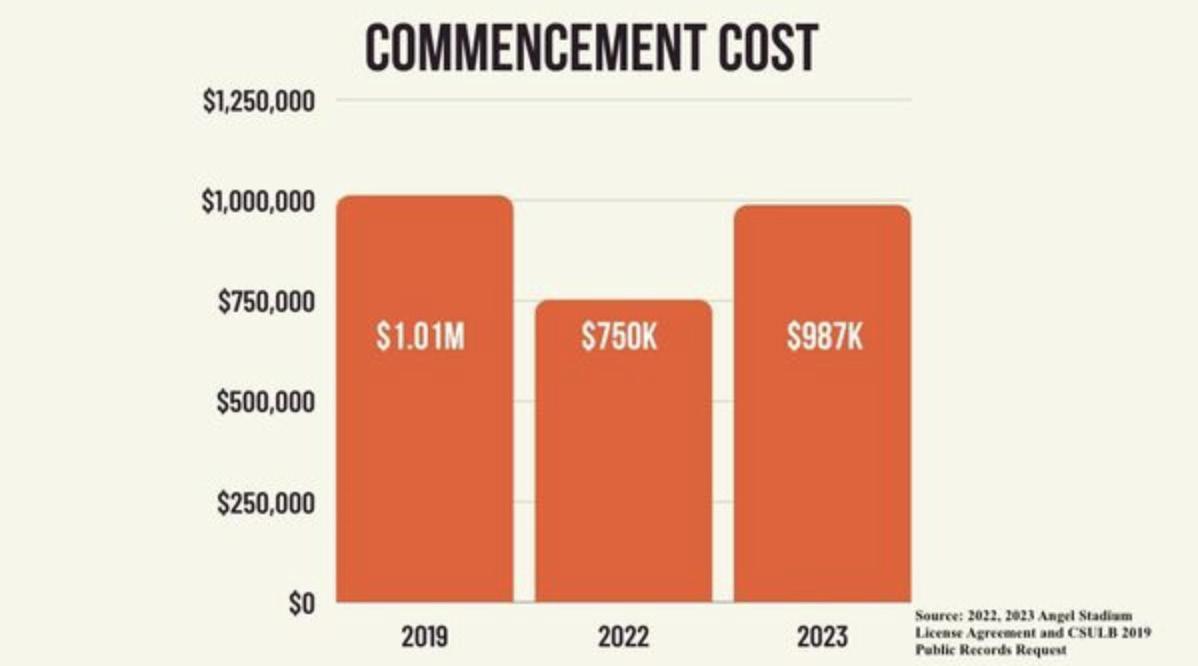
Angel Stadium will be hosting Long Beach State’s spring commencement for the third year in a row.
While there are students and others upset that the ceremony won’t be on campus, deans from CSULB understand that having the ceremonies at Angel Stadium is better than being held at the university.
Having a bigger space for commencement, better security, better parking and utilizing Angel Stadium staff to help through the ceremonies are some of the reasons why the stadium is the better option.
“Commencement ceremonies that have grown pretty large is no small undertaking,” said Dean of the College of Business and professor of finance Michael Solt. “A decision on the venue is really important. I think this year, we are going to have my college over 1,400 graduating students. And I think in the past, it used to be more around 1,000 or 1,100.”
During his 15 years at Long Beach State, Solt experienced ceremonies on upper campus near the library and down to the sport fields. Since the class of 2020 didn’t have a ceremony, it was joined up
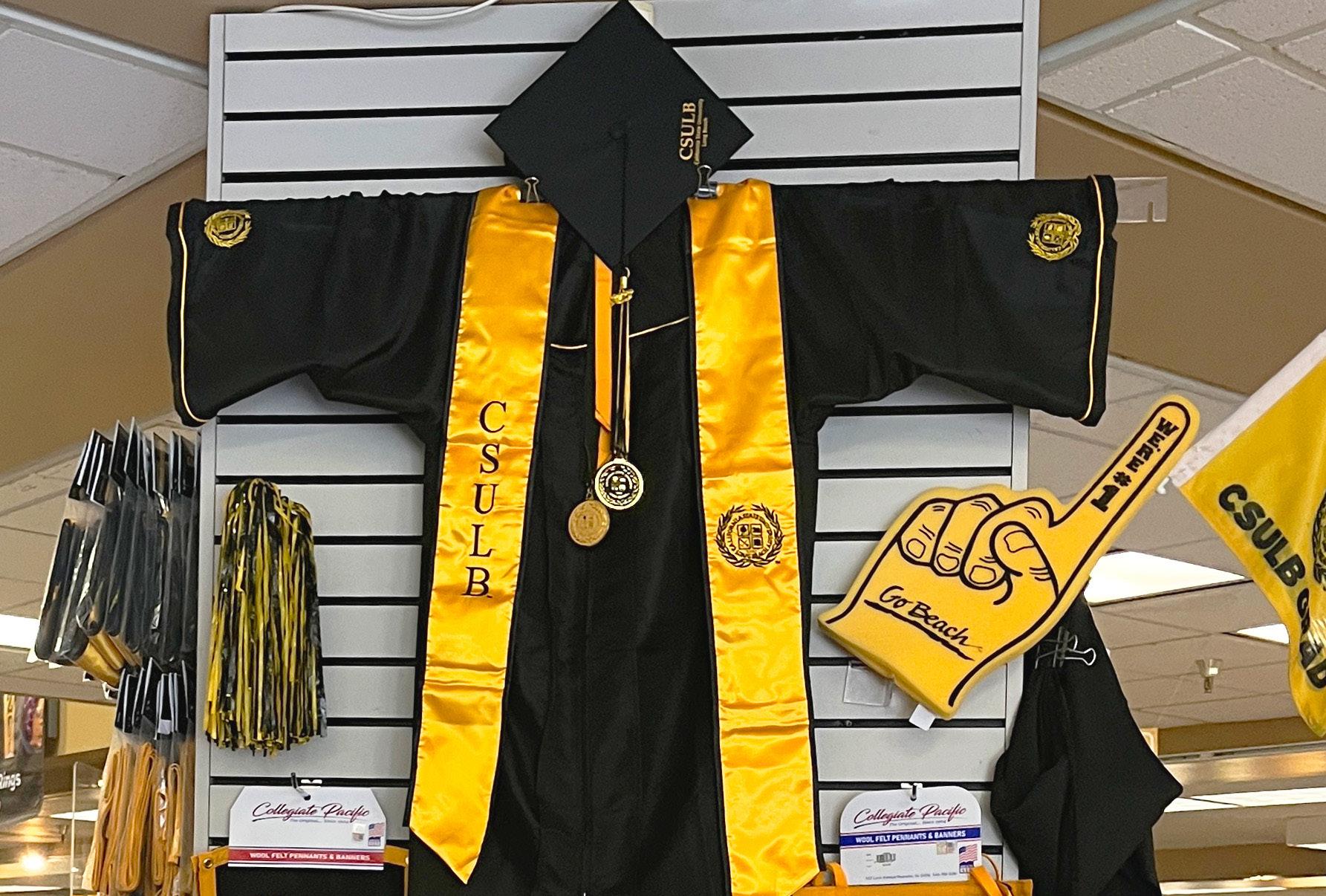
with the class of 2021’s commencement and Angel Stadium hosted for the first time.
“We went to Angel Stadium, had wonderful ceremonies with stages outside so that students can have photos of themselves or with their families, or even with deans,” Solt said. “That turned out to be a good experience and I felt overall positive about the 2021 ceremony. I was supportive when the decision to go back in 2022 was made to Angel Stadium.”
Graduate recognition stages will be provided outside the stadium for students to walk across and have their name read out loud for their supporters. Solt said he feels positive about having these stages again for students.
“The process with that procedure does not allow the students to walk across the stage [during commencement] and be recognized individually. So that’s the only difference. And I understand the students concern on this,” Solt said.
Angel Stadium provides more security and is better to make everyone safe because of the larger number of participants compared to the years before.
“I’d hate to be the sitting president, if something happened, based on a decision I made around less safety versus more safety,” Interim Dean of College of Education Anna Ortiz said. “Unfortunately, that’s a reality that we live with right now.”
Since CSULB is next to seventh street
and is next to a major freeway, it would be easier for anyone to access commencement ceremonies from a variety of vantage points, according to Ortiz.
“I think that the level of safety at Anaheim is the most compelling reason I see for it to be over at the stadium,” Ortiz said.
Parking issues are another reason why the commencement ceremonies would be better at Angel Stadium instead of the CSULB campus, according to Solt. Ortiz agrees with having better parking as an option, especially for those that need handicap spaces.
“I think parking is easy to get the stadium. It’s not easy here on campus,” Ortiz said.
She hopes students decide to attend their commencement ceremonies because of the hard work that is being made to make them festive and student-centered as possible.
“It kind of breaks my heart a little bit when I hear students who are saying they don’t want to go over there because their name is not going to be called,” Ortiz said. “There’s lots of other things that happen over there that are also festive and it means so much to families.
“They still play ‘Pomp and Circumstance’ [during the] the procession and that’s still very moving.”
Long Beach State deans agree to have the 2023 spring commencement back at Angel Stadium after experiencing positive results.
When the Long Beach State class of 2023 learned they were, for the third time, not permitted a traditional graduation ceremony at Angel Stadium, these three students took charge giving voice to their outrage.
Mahek Patel created a Discord chat after she and other graduating CSULB students received an email on Feb. 21 which announced another non-traditional graduation ceremony.
“The ‘What to Expect’ page said to refer to the videos from 2020... and we realized we’re not walking,” Patel said. “Our names are not going to be read.”
Patel then created a Discord server and sent the link to her other class Discord servers, which then began to circulate. The Discord chat was small, with only about 50 members, before Elrachid got in contact with Patel.
“The Discord became a space for plans on what we’re going to do next,” Patel said.
After she had created the Discord, Patel emailed the dean of students, who referred her to Jeff Klaus, associate vice president of student affairs. Klaus met with Patel and Elrachid, along with 20 other students, via Zoom on March 13.
Patel said Klaus couldn’t answer their questions concerning the ceremony because he wasn’t on the commencement team. Klaus did, however, connected them with commencement team member Christopher Reese.
However, their attempt to meet with Reese became a dead end.
“Reese said he was busy for the next two weeks, and after two weeks, it was Spring Break,” Patel said. “Basically, we were not going to be able to talk with him.”
Patel said she also reached out twice to Daniel Montoya, vice president of student affairs, but did not receive a reply. An official email for their organization was created, and the organizers contacted CSULB President Jane Close Conoley.
“[Conoley] responded with an email that didn’t actually answer our questions,” Patel said. “After that, we realized they’re not going to talk to us.”
Zeina Elrachid, a molecular cell biology major and first-generation student, started a petition to protest the university’s commencement on March 2, which has accumulated over 18,600 signatures as of April 6.
Her parents were shocked to find out that their child, along with all seniors, would not be walking the stage or hearing their names called.
“My parents are so outraged,” Elrachid said. “My dad is really upset. He actually just sent an email to President Conoley today and said, ‘we need to make a change.’”
Elrachid said Conoley should re-evaluate her decision and say the name of all graduating seniors.
“She gets paid to do that,” Elrachid
said. “She should have a little bit more motivation and understanding.”
Elrachid is determined to change the current stance of commencement not only for this year but for future graduations down the road. If the 2023 class ends up not walking, she wants a written statement promising the next class will.
“I don’t think we’re doing anything wrong, just speaking up for what we deserve,” Elrachid said.
During the CSU Board of Trustees meeting, which Conoley was present for, on March 21, Elrachid gave a personal statement.
“I know you all have graduated from college at one point or another,” Elrachid said. “I’m sure you still remember the day you walked that stage, with your name called and your loved ones cheering you on. That’s the tradition we’re fighting to keep.”
Po Garcia, a linguistics major, didn’t get to have a traditional graduation ceremony at her community college when she graduated in 2020 due to the pandemic.
“Being able to have the experience at Long Beach, what I thought I was going to have, meant a lot to me,” Garcia said. “The longer I sat on it made me angrier.”
When Garcia joined Patel’s Discord server, which had 100 members at the time, Garcia said the server was infiltrated with trolls and seemed unorganized. After she privately messaged Patel with a suggestion to create separate channels, Patel offered to make her an admin, which Garcia accepted.
“My fiancé is invested, too,” Garcia said. “He’s been working off in the background, and he’ll send me information.”
Garcia’s now husband, whom she married over Spring Break, is a public speaking tutor and is “really good at being able to think on his feet.” He helped cultivate the best way to respond to the commencement team’s and Conoley’s emails regarding the ceremony, according to Garcia.
On top of being an admin for Let ‘23 Walk and planning her wedding (which involved sewing her own wedding dress), Garcia also is a commuter from Upland.

“It has been really difficult juggling it all,” Garcia said. “I do believe that’s why I got sick.”
Garcia had to miss a couple of weeks of school when she fell ill and had to make
up her midterm exams. However, that didn’t stop her from designing the posts for the Let ‘23 Walk Instagram page or from meeting with fellow organizers over Spring Break to spend five hours making protest signs.
“We’re not planning on backing off at all,” she said.
My dad is really upset. He actually just sent an email to President Conoley today and said, ‘we need to make a change.’
Zeina Elrachid Petition starter
graduation season approaches, many graduating seniors across the country are eagerly anticipating their long-awaited traditional commencement ceremony. The pomp and circumstance, the closeness of loved ones, hearing their names called out and feeling a sense of pride and acknowledgment.
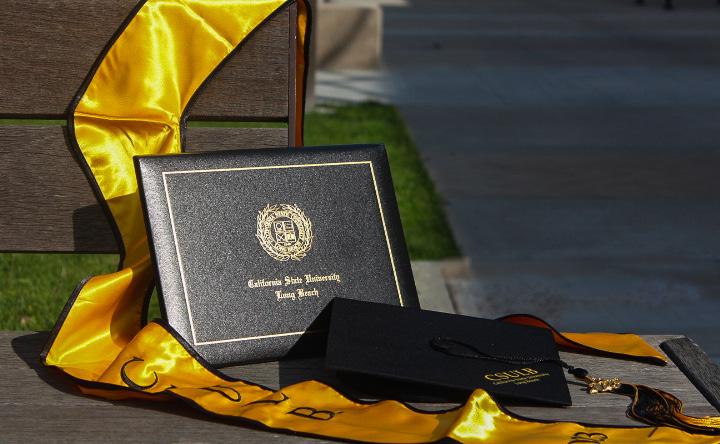
Unfortunately, for the class of 2023, this momentous occasion is being taken away from them by administration, who have decided not to allow them to walk across the stage during the ceremony.
The reasons for this decision continue to be backed up with excuses from the event organizers that are fallacy in their own.
When the ceremony was moved to Angel Stadium, 25 minutes from Long Beach, it was meant as an alternative due to COVID-19 regulations allowing for more space. But as the campus is now back to normal with in-person classes, games with sold-out seating and evidence of extracurricular activities flourishing during club rush week, why is this poor substitute of a commencement ceremony seen as “better.”
Graduating from college is a significant achievement in one’s life that signifies the end of one chapter and the beginning of another. A school with over 30,000
first-generation students needs to realize that the decision to pursue higher education is an extended milestone that involves an entire community hoping to celebrate with their students, which would be in a traditional commencement.
Over and over, administration continues to gaslight the student body and impose their views on how this ceremony style is better and more comfortable for guests and easier on the faculty. But they fail to hear the chants and demands that what should be at the center of the ceremony are the students that spent more than four years at CSULB.
If this ceremony is meant to “recognize” students, why doesn’t the administration ask us what we want to happen? Why don’t they involve students in the
planning of the ceremony? Is Conoley and administration that tone deaf to continue blocking us out and sighing at the end of each e-mail?
There are numerous examples of other universities like CSUF, CSUN, CSUDH that successfully returned to traditional graduation ceremonies so the bigger question to answer is if this decision is being made because of money or effort.
$1.2 million dollars is a lot of money. Though the holes in the administration’s logic start to appear when the school that’s closer to Angel Stadium spends that same figure to host ceremonies on campus and not haul their entire graduation there to “cut costs” and “create comfort.”
This also highlights a broader issue with a lack of communication and
transparency between administration and students. The decision made not to allow graduates to walk across the stage without any explanation demonstrates a disregard for the student body and a failure to prioritize their needs.
CSULB needs to implement a better strategy in the commencement planning by creating a campus-wide committee that involves students. Simply sending out e-mails and surveys to the student body about what they want in a ceremony and disregarding the replies later breaks any trust students have in the administration to do their job well.
The class of ’23 worked hard to reach this momentous occasion and they deserve the opportunity to walk across the stage and celebrate their accomplishments. Administration needs to prioritize the needs and well-being of students, particularly during such a significant moment in their lives.
Fourth-year student, Zeina Elrachid started an online petition on Change.org demanding the class of ’23 walk along with two other students. In just over two weeks, it’s reached over 18,000 signatures from students and parents.
“I think she [Conoley] should have more motivation and understanding,” Elrachid said. “You can’t just cut it down because it’s convenient for you. You can’t cut our experience down.”
Denying students, the opportunity to experience a traditional graduation ceremony is not only disappointing but also a disservice to their efforts and sends a clear statement that their hard work and dedication aren’t valued or recognized.
AsIf this ceremony is meant to ‘recognize’ students, why doesn’t the administration ask us what we want to happen?
“



For a vast majority of Long Beach State students, walking across the graduation stage while hearing their names called for family and peers to witness has been a major incentive throughout years of grueling hard work.
From working multiple jobs to afford tuition and housing costs to investing years of their lives to finish their degrees, a traditional commencement ceremony is the least students can expect from the university.
However, the CSULB administration announced that they will host a COVID-modified graduation ceremony at Angel Stadium for the third year in a row, meaning that graduates will not have their names called nor have the opportunity to walk across the stage.
Considering that many students may only experience their college graduation once, the graduating seniors’ feelings of frustration and betrayal are rightfully justified, especially those of low socio-economic and first-generation backgrounds.
For students like Tatiana Navarrette, a Film & Electronic Arts major on the narrative track, her college graduation is a special moment of celebration. This is a major accomplishment within her family due to her first-generation status. But because Navarrette is unable to walk, she feels as if there’s hardly a celebration for her and her class’s accomplishments.
“I’m the first person on my dad’s side of the family to graduate from college, so it’s sad that I won’t hear my name called for graduation,” Navarrette said. “I’m just hoping that if they’re smart, they’ll listen to their students, especially the president.”
As a transfer student from Long Beach City College, Navarrette had applied to and received acceptance offers from various universities, but chose to attend CSULB for their film department. However, after she heard about the structure of the commencement ceremony, Navarrette felt betrayed.
Similarly, animation and illustration major Jordan Glickman expressed feeling misled by the administration. He assumed that the phonetic pronunciation request through his account meant his name would be read aloud. It wasn’t until a classmate shared a post on the Instagram account @letcsulbwalk23 that he found out he wasn’t walking.
“That’s what separates this year’s commencement compared to the last two years. Our school wasn’t upfront with what they were doing at all,” Glickman said. “They made us pay for something we didn’t know we were paying for and now we’re signed up for a commencement that nobody wanted.”
What was supposed to be one of the biggest milestones in a young graduate’s career is now tainted by the lack of sympathy on the administration’s behalf.
President Jane Close Conoley sent the graduating class several inconsistent emails that contain flawed rationale regarding why CSULB cannot host an on-campus ceremony.
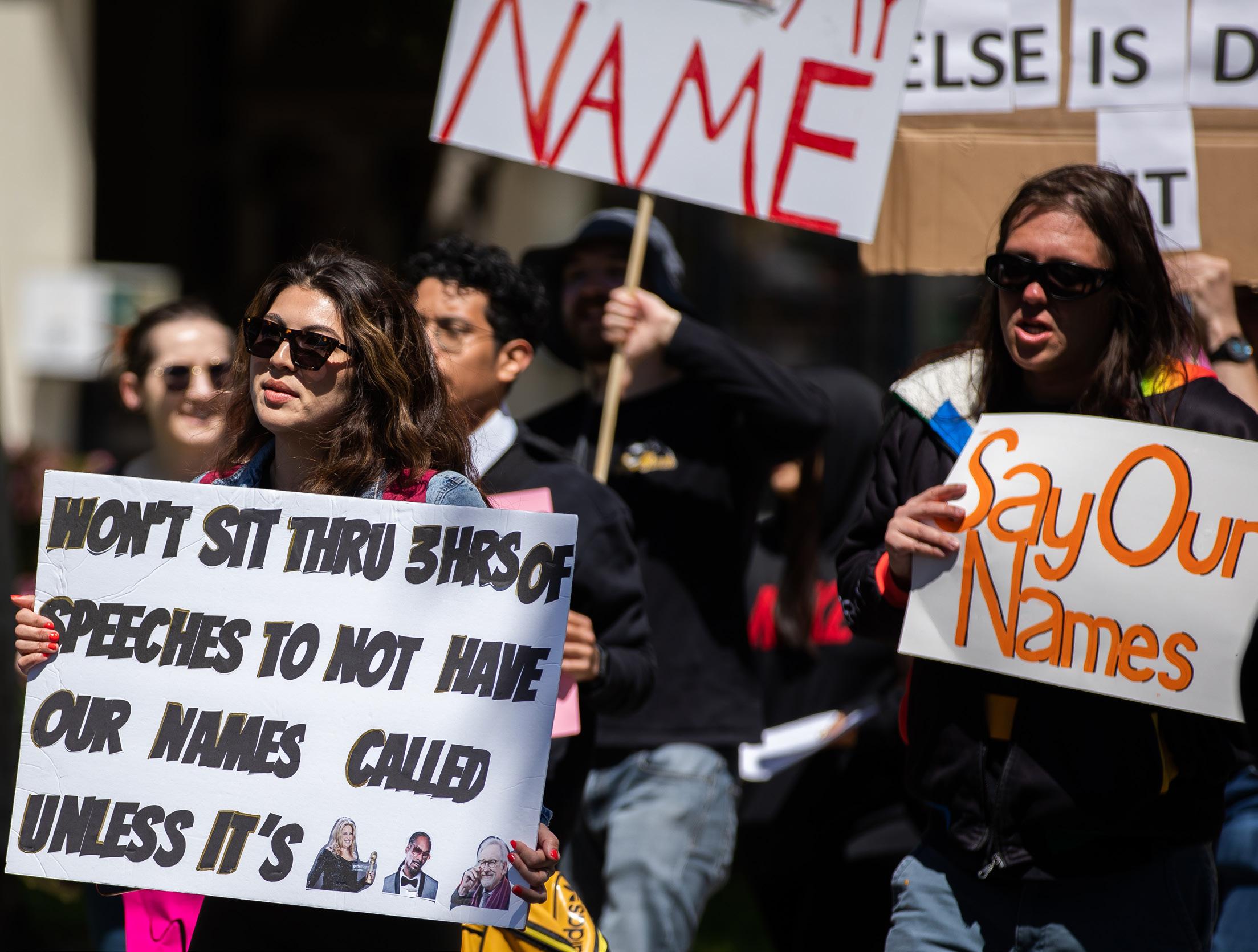
In an email sent to Zeina Elrachid, the user behind @letcsulbwalk23, Conoley attributed the main deterrent for a traditional on-campus ceremony to a lack of funding. But with a graduation ceremony fee of $150 for each of the 15,000 students expected to attend in addition to the profits from the graduation attire, photos and souvenir sales—this made no sense.
Considering that the institution plans to spend $55 million repairing the leaks in the roof of the Walter Pyramid, students question where CSULB’s main priorities lie when it comes to funding, as the institution’s number one priority is to serve the student body.
The lack of transparency from the administration prompted CSULB alumnus Ryan Mardon to file a Freedom of Information Act (FOIA) request form regarding any communication between the president and representatives from Angel Stadium as well as the provost, including any financial records and signed contracts.
“I felt like the rationale seemed
very haphazardly answered. It seems like there’s a reason they can’t get out of the Angel Stadium graduation, so it makes me wonder if there’s a contract signed that they never said anything about,” said Mardon. “I just felt that the school wasn’t being fully transparent.”
According to Mardon, the agency determined that some of the records were accessible to the public and will be sent in the following weeks.
Not only does the current commencement format rob students of the true graduation experience, but parents and family members who have waited the graduates’ entire lives to see them walk share similar feelings of disappointment.
As a single mom of a 2023 graduate, Elsa Pierce stated that her son’s graduation would have been a monumental moment for her family as he will be the first of her children to graduate from college. However, if the current structure of the ceremony were to remain, Pierce and her son will not be in attendance.
“As a parent who has sacrificed so much, it’s everything to me. To hear his name being called out is the epitome of everything we have sacrificed for,” Pierce said. “That one moment is so significant because it’s tradition and I don’t feel that it’s fair that it’s being taken away from us.”
Pierce was originally a prospective
transfer student herself, but she no longer plans to accept her offer from CSULB for the upcoming fall after the commencement ceremony format was announced.
As a graduate of the school’s undergraduate and master’s programs, English Composition instructor Jake Teran sympathizes with the graduating class’ frustration as he acknowledges the significant milestone that is graduating from CSULB.
Although hope has dwindled among students, Teran believes that the amount of online exposure generated in the past several weeks may be a catalyst for creating change.
“There could be some change in the favor of students to where they call them individually, allow them to walk on stage and the parents could see them on the big screen,” Teran said. “That can be possible. Although it might not be everything the students want, at least it would be a big step forward.”
Although graduation season is right around the corner, the administration still has time to cut meaningless speeches to include time for name-calling and a stage can still be provided for students to walk across.
After all, it’s the least they deserve for getting their degree during the pandemic while still having to pay full tuition.